Review for Magi The Labyrinth of Magic - Season 1 Part 2
Introduction
Since the review of Part 1 of Magi: The Labyrinth of Magic a couple of months ago, the sequel series has finished its streaming run on Animax. And just as expected, The Kingdom of Magic ended with the promise of more Magi yet to come. It also continued the perplexing storytelling style and character development that The Labyrinth of Magic established, by turns infuriating and entertaining. With Magi, it appears as if someone took a shonen action series like Naruto and Bleach, and threw a theatrical level budget at it. Then again, the summer blockbuster, as reinvented by Michael Bay and J.J Abrams has done the same for Hollywood cinema, creating very expensive looking and high quality mediocrity. On occasion, a production will rise above such mundanity. Maybe Magi: The Labyrinth of Magic Part 2 will find the space to shine as well.
Magi is set in an alternate history of sorcery and magic, where kings are chosen, not just born to power. The ones who do the choosing are the rare embodiments of magic in this world, the Magi, and those chosen must battle through mysterious towering dungeons to gain artefacts of magic and power to earn the right to rule. Aladdin is a young boy who knows he’s a Magi, but know precious little else about himself, other than an instinctive appreciation for all things bosom-y in life. In a desert-bound town that hosts a dungeon, he encounters Alibaba, a hard working ambitious young man who dreams of conquering a dungeon, but who has trained himself to choose expediency over doing the right thing, despite his natural instincts. They also meet a young slave girl named Morgiana, who is shackled more by the chains in her mind than those on her legs. Circumstances lead them into the dungeon, and set them forth on an adventure that will change all of their lives.
At the end of the previous collection, the three adventurers were reunited in Balbadd, which turned out to be Alibaba’s home country. What’s more Alibaba was revealed to be the third prince of Balbadd. But this was no pleasant homecoming. The previous king had died, and Alibaba’s older brother Abhmad had taken the throne, and in his greed for power and riches, had sold his nation’s future to the Kou kingdom. When Aladdin and Morgiana caught up to Alibaba, he was now at the head of the Fog Troop with his childhood friend Cassim, a resistance movement against the royal family. But with dark forces manoeuvring events in Balbadd to their own malicious ends, and a rift appearing between Alibaba and Cassim, it looks as if Balbadd is on the road to ruin. And into this maelstrom appeared the figure of Sinbad, king of Sindria. As a last ditch effort to find a peaceful solution, Alibaba appeared at the palace to negotiate with Abhmad.
The next twelve episodes of Magi are presented across two Blu-ray discs thus...
Disc 1
14. Alibaba’s Answer
15. Cassim’s Answer
16. Solomon’s Wisdom
17. Smile
18. Kingdom of Sindria
19. The Name of the Culprit is Sinbad
20. The Two Princes
Disc 2
21. The Dungeon Zagan
22. Household of Flames
23. Battlecry
24. The Fall
25. Alibaba and Aladdin
Picture
Magi: The Labyrinth of Magic gets a 1.78:1 widescreen 1080p transfer on these Blu-ray discs. With 7 episodes on one dual layer disc, and 5 on another single layer platter, and not much in the way of extra features, there’s little issue with compression and the like to contend with, and the anime comes across with detail, clarity and rich colour. There isn’t even much evidence of digital banding, which makes this one of the better HD anime releases. That’s all for the good, as Magi is a show which really excels in the world design, basking in the Middle East setting, rich in architecture, ambience and style, and you can bet that there’s a lot of faux Arabic calligraphy, plenty of Persian rugs, and lots of rich detail to make you glad that you’re watching this in High Definition and not pesky DVD.
The same can’t be said for the character designs though, which underneath their Arab robes, fezzes and turbans wind up as pretty generic for anime characters, although the djinns are impressive. When I first watched the show online my initial concern was for these characters’ teeth. There’s something weird about how their mouths are animated, which makes me think that their dentures are coming loose. The same was true for this home video viewing.
The images used in this review are kindly supplied by the PR and aren’t necessarily representative of the final retail release.
Sound
You have the choice between PCM 2.0 Stereo English and Japanese (and if you select the other menu when you insert the disc, 2.0 French), all encoded at 2.3 Mb per second. I went with the Japanese audio and was pretty happy with the experience, the actors seemed well suited to their roles, the show’s action sequences came across well, and the music was a key part in selling the Middle Eastern atmosphere and the setting, although following a significant initial impact in the opening episodes, there was a slow generic creep to the music that made it seem blander as the series progressed. The subtitles flow well and are easy to read, free of typos and accurately timed. A couple of issues might be that the theme songs aren’t translated, while single word or short sentence translations might flash by a little too quickly to read. They really need to linger on screen for longer than it takes the character to speak in those instances. There is a signs only track, but for this series, that amounts to translating the episode title and not much else. Note that if you watch the Japanese version, and someone happens to be speaking during the episode title screen, then the episode title will also just flash by (missed completely on episodes 11 and 12), and you might need the pause button to read it. As per usual for Kazé discs, the subtitles and audio permutations are locked away from user access, although thankfully for Blu-ray, you do have the pop-up menu to let you change the audio during playback.
I avoided the English dub this time around, but I still feel it’s a missed opportunity.
Extras
Insert the discs, and you have the choice between English and French menu screens. On both discs choose the French menu, and you get trailers for Garden of Words, and Buddha: The Great Departure. With the English menu you get HD trailers for Bakuman and Penguindrum, DVD only releases in the UK.
Then the animated menu loads up, and the clunky interface offers you audio options, episode select, play all, while the only extras are on disc 1, and amount to the karaoke credit sequences. The first time I tried it on disc 1, the menu froze after I made my audio choice, and I had to restart the disc.
Conclusion
Very little changes for the second half of Magi: The Labyrinth of Magic. It’s still the high production value, well-budgeted, shonen action show. It still is wholly of that genre which is inhabited by shows like Naruto and One Piece, albeit with visuals that border on the theatrical quality, a soundtrack that is grand and symphonic, and with an eye on pace of narrative that doesn’t have room for padding or filler. It’s like comparing a 50s B movie to a modern summer blockbuster. The roots are the same, but the blossoms are completely different. But once you look beneath the shiny livery, it’s still pretty much the same thing, and Magi doesn’t have the narrative chops to transcend its genre the way that a show like Fullmetal Alchemist managed.
We pick up where the previous collection left off, with the situation in Balbadd still in the balance, and with Alibaba trying to find a peaceful solution for his homeland. The problem is that there are forces from without that are invested in seeing Balbadd caught up in turmoil and self-destruction, while no matter how peaceful a solution he may find, his childhood friend Cassim is not as forgiving of the royal family. Cassim wants blood and that sentiment pushes the confrontation over the edge. As is typical for shonen anime, both Alibaba and Aladdin find new powers within to fight the encroaching menace, or as the shorthand usually goes, they level up. So do their opponents of course, it wouldn’t be much of a battle if they didn’t. What becomes clear is the nature of the enemy, a group called Al Tharmen who are deliberately creating unbalance and strife, war and destruction among nations to achieve their own twisted goals, and you get some idea of that with what happens in Balbadd.
The situation is resolved, although not to all tastes, and Alibaba winds up exiled from his own nation. Which is where the next arc of the story begins, with Alibaba, Aladdin, and Morgiana made welcome in Sinbad’s kingdom of Sindria. They also get to train with Sinbad’s generals, Aladdin learning more how to control and use his magic, Alibaba improving his swordplay, and Morgiana getting a metal vessel of her own, with which to enhance her fighting skills. It’s a brief few episodes of respite, before the action resumes. The dying moments of the Balbadd situation left Alibaba with a curse, a curse that becomes manifest in Sindria, affecting both him and Sinbad. To find a cure, they need to conquer a dungeon, and the three friends are now joined by a prince of Kou to conquer Zagan’s dungeon. But this is where Al Tharmen’s plans coalesce. They set a trap for the dungeoneers, draw them in, while they launch a full on attack on Sindria, and this leads to the series finale.
Once more, while the production values may be fantastic, the storytelling is really mundane, with the show toying with an idea, developing a plot line only so far, and then dropping it like a cat toy, only to pick up on the next shiny thing. That, coupled with the character overload (you’re bombarded with characters in this show that rarely get sufficient development), means that when the show does pick up on an idea that it had dropped five or ten episodes ago, you’re hard pressed to remember just how important or meaningful it is in the story. It makes Magi feel like a trivial and disposable show, where more cohesive writing could have made it a classic.
Where this second part improves on the first is that it keeps the three main characters together for the most part. Alibaba, Aladdin, and Morgiana alone are fairly interesting, but it’s when they interact that the show really does have promise. And again, I find that the real strength of this show is the character of Morgiana. In Part 1, she had that memorable scene where she kicked through a giant monkey! In part 2, Morgiana dances! You see it in the new opening sequence for the show, but you also see it in an episode too, and it is my highlight of the whole series. Morgiana makes Magi: The Labyrinth of Magic work. I’ll let you into a little secret. That’s the reason why I don’t like the sequel, The Kingdom of Magic as much.
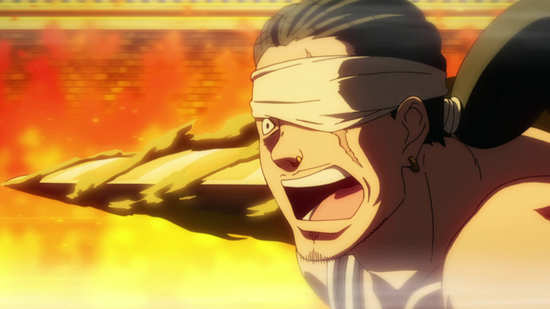
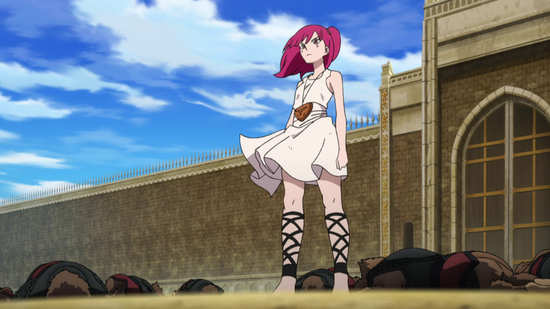
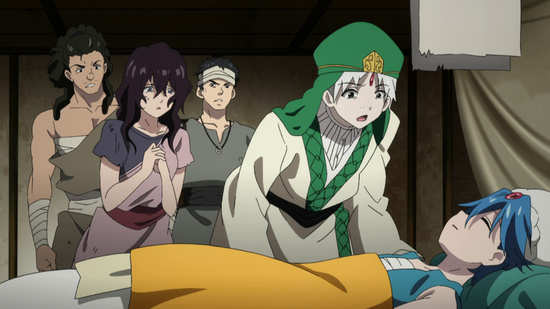
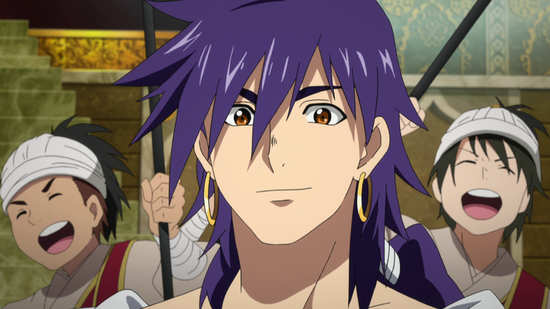
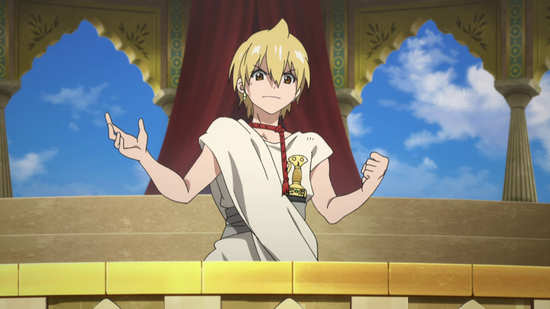
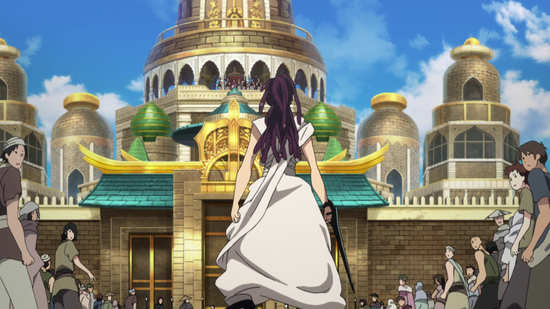
Your Opinions and Comments
Be the first to post a comment!